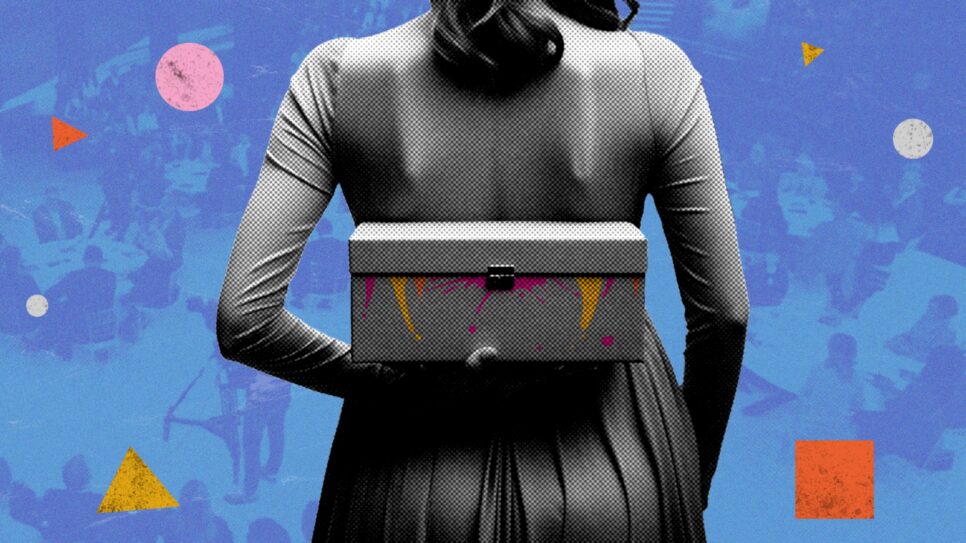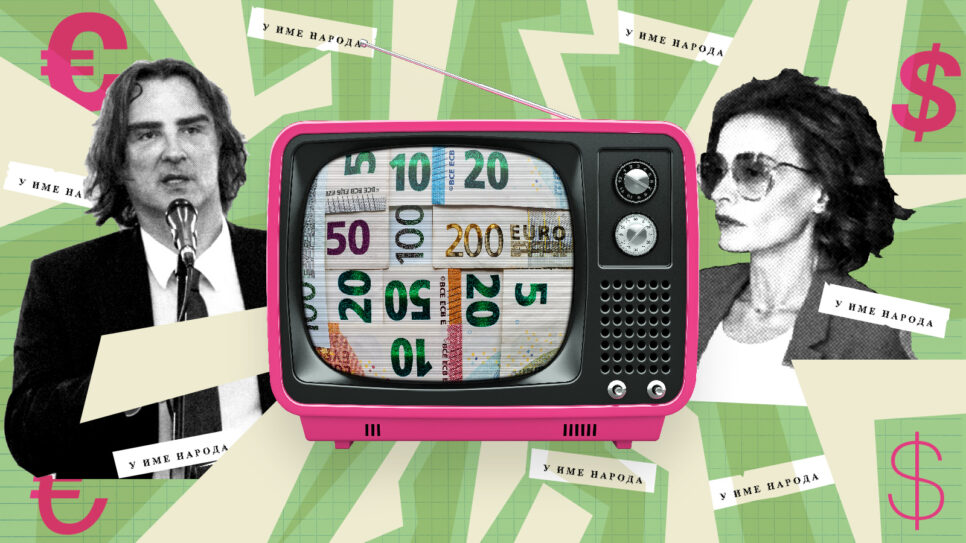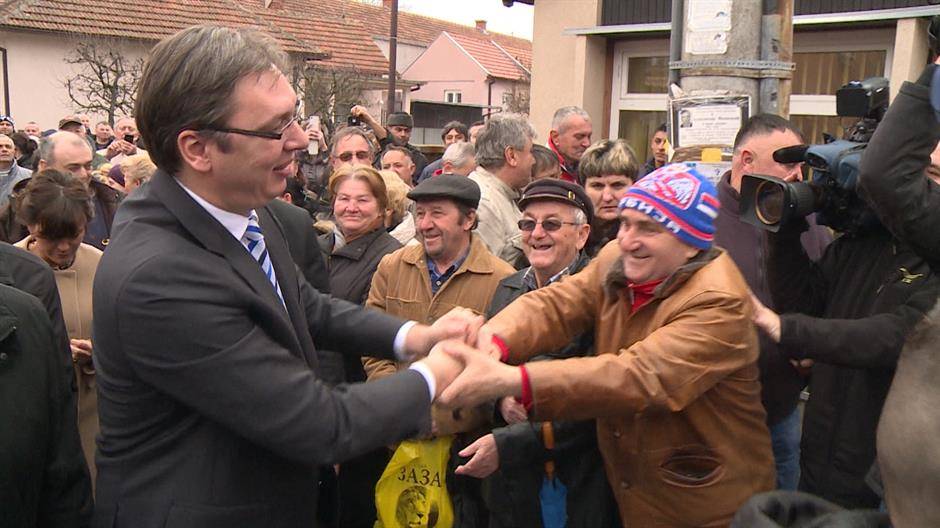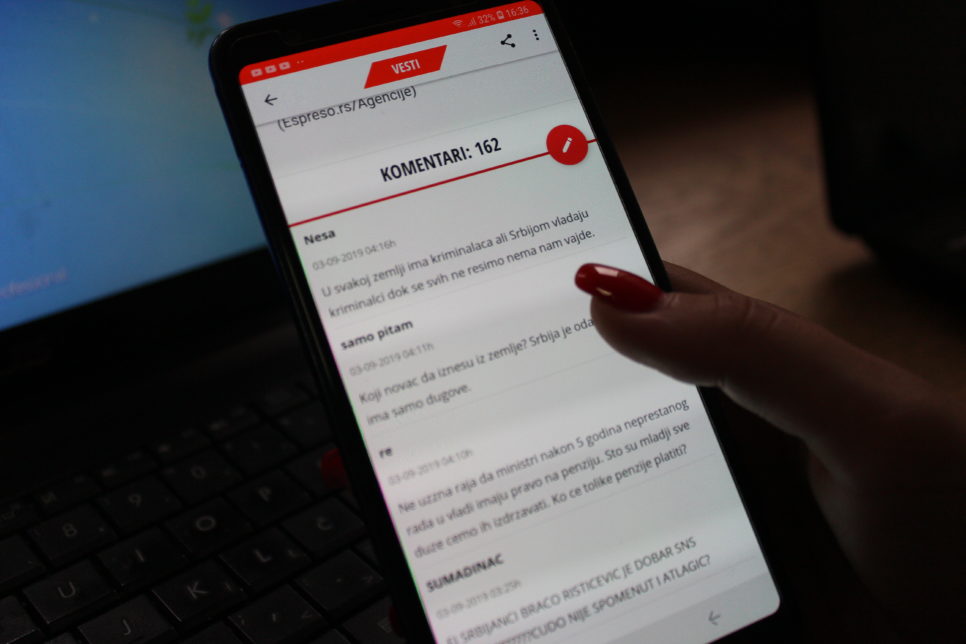On the last day of 2017, the Serbian Broadcasting Corporation (RTS) broadcast the first episode of the long-awaited show Nemanjići – rađanje kraljevine (The Nemanjić Dynasty – The Birth of a Kingdom). Heated public reactions ensued. A whole host of complaints about the acting, the language, the script, the directing was the hot topic in the media and on social networks for days. Viewers, however, did not know that RTS had been allowed to air more commercials than usual during that and all the following episodes.
Instead of for six minutes, in line with the Advertising Law, the Regulatory Authority for Electronic Media (REM) enabled the public service to air nine minutes of commercials within the hour.
During the same hour, ads shown on commercial televisions such as Pink, Prva or Happy can last twice as long – 12 minutes, i.e. up to 20% of time per hour.
The reason why advertising on RTS is limited is the fact that it is a budget-financed television, with the bulk of its funding coming from citizens’ subscriptions, which is why it is not forced to earn income exclusively through commercials, like other televisions do. Thus the public service’s budget in 2018 amounted to roughly 90 million euros, a quarter of which was advertising revenue.
Contrary to the law, REM gave RTS permission to prolong its commercial breaks a week before the Nemanjići premiere. At a session the REM Council claimed that the great importance of the TV show justified the decision.
However, REM has a special list for such cases – a list of events of national interest, which envisages exceptions to the six-minute limitation. The list includes live broadcasts of international sporting events, such as the soccer World Cup, the Wimbledon tennis tournament, as well as music festivals like Exit, or the BITEF theater festival. This list has undergone changes over the years, but it always includes sports competitions and cultural festivals.
Although the list does not contain TV shows or movies, research conducted by the Center for Investigative Journalism of Serbia (CINS) reveals that RTS was given permission to extend commercial breaks during the airing of six shows – in 2017 for Santa Maria della Salute, Vojna akademija, Senke nad Balkanom, and Nemanjići, while previously it was allowed to do so in the case of two shows – Bićemo prvaci sveta (We Will Be the World Champions) in 2015 and Montevideo, Bog te video (Montevideo: Taste of a Dream) in 2011.
REM did not allow extended commercial breaks during the shows Koreni (Roots), Žmurke (Hide and Seek) and Odeljenje (Rehab). In the case of Bićemo prvaci sveta, the permission also applies to all future reruns of the show.
“This is one of the situations in which both RTS and REM act contrary to legal norms instead of initiating changes to those rules, which are obviously not flexible enough,” Transparency Serbia Program Director Nemanja Nenadić told CINS.
CINS found the data on the extension of commercial breaks on the REM website, in the minutes from the Council sessions. They show that when issuing certain permits REM acknowledged the recommendation letters RTS had received from certain ministries.
However, in its decisions the Council did not clearly specify the criteria for giving consent, i.e. whether recommendation was a condition for prolonging commercial breaks.
CINS journalists requested, but never got an interview with a Council member in order to find out what regulations the decisions were based on, and also no one from this institution answered the questions. REM did not respond to requests for access to information of public importance either, which CINS sent more than a month ago, in a bid to obtain copies of the documentation based on which REM made its decisions.
Profiting from National Interest
Citing the importance of these TV shows, RTS was enabled to earn additional revenue.
According to the official pricelist, one second of advertising on RTS at 8 p.m. these days costs 9,000 dinars (76 euros). That is the most expensive advertising slot after the television’s primetime news.
CINS has no data on the number of episodes of Nemanjići in which RTS extended the commercial break, but if they used the three extra minutes in all 13 episodes of the show, they may have earned 174,000 euros in total. The sum does not include possible quantity discount or the ratings of a show that could affect the price.
Applying the same calculation – according to the pricelists from the years when all six shows premiered – the revenue from additional commercials would total up to 1.37 million euros.
Nemanja Nenadić believes that labeling content as a program of national interest is “just a façade concealing the existence of commercial interest.” He explains that amendments to the law would enable RTS to earn revenue when broadcasting programs with commercial potential.
“That would be better than this farce happening in the approval system,” said Nenadić.

Privileged TV Shows
Season three of the popular TV show Vojna akademija premiered on RTS on February 19, 2017. Eight days later REM decided to accept a request filed by the public service and allow commercial breaks “lasting nine minutes within an hour.”
RTS Director Dragan Bujošević previously said in a memo to REM that a positive decision would be “in the interest of financing the core activity of the public media service, which the Republic of Serbia is obligated to provide on a stable and sufficient level.”
According to Bujošević, that was not the first time the television got more commercials for this show. During the first and then again during the second season, the Ministry of Defence sent the same proposal, claiming that the show “popularizes and affirms the armed forces, especially the cadets and heads of the Military Academy as the most elite institution of the Serbian Armed Forces.”
The List of top events of special importance to the citizens of the Republic of Serbia at the time when season three was being broadcast included 30 events from the area of culture, such as jazz festival Nišvil (Nishville), Mokranjčevi dani (Days of Mokranjac) festival, as well as a large number of sports competitions in soccer, volleyball, basketball, and other. Vojna akademija was not on the list.
Slobodan Veljković, a former member of REM Council, said that the “precedent” of extending commercial breaks for the show Montevideo, Bog te video occurred prior to REM’s decision.
Republic Broadcasting Agency Started the Practice
According to the data CINS gained access to, the practice of extending commercial breaks on RTS existed even before 2017 – during the airing of the shows Bićemo prvaci sveta and Montevideo, Bog te video. The ministries asked REM to greenlight more commercials – because those were shows of importance to the citizens.
Thus the Ministry of Youth and Sports in December 2014 sent a memo to then the Republic Broadcasting Agency (RRA), now REM, which reads:
“The project Bićemo prvaci sveta, directed by Darko Bajić and produced by the Intermedia Network company, promotes the right values, points youth to the right attitude toward sports and cheering, and highlights the postulates of healthy living and everyday engagement in physical activity, which the Ministry of Youth and Sports and the Government of the Republic of Serbia advocate.”
Two months later the REM Council accepted the Ministry’s reasoning and approved the initiative that would pertain to all airings of the series on RTS, including reruns.
Intermedia Network, which co-produced the show with RTS, was founded in 2003 and is today owned by a Cyprus-based company called Kryden Trading Limited. It has produced several Serbian movies, documentaries and TV shows, including the show Montevideo, Bog te video in 2011.
The show was supported by two ministries – the Ministry of Youth and Sports and the Ministry of Interior, which asked RRA to extend commercial breaks during the episodes, and that request was eventually adopted.
“That was before I was appointed as Council member, but then, if it had been approved for that show, there was no reason not to approve it for Vojna akademija, especially since that Vojna akademija actually does have big expenditures by the military, various technical devices, equipment, aircraft, the show is shot in their facilities.”
He told CINS that the main idea behind such decisions had been to help RTS, but that the producers of the TV shows made additional earnings through the decisions made in some cases.
CINS journalist requested an interview with Dragan Bujošević, but got no reply. Instead, she received confirmation from the RTS PR service that the money from the commercials goes to those who finance a TV show – be it an RTS production or a collaboration between the television and a production company.
According to the 2017 pricelist, prolonging a commercial break per one aired episode may have brought RTS additional revenue totaling 13.3 thousand euros.
Keeping in mind that Vojna akademija had 15 episodes in its third season, the same revenue during the first airing of the entire series could not have exceeded 200,000 euros, and in all three series 609 million euros.
RTS created the show in co-production with the Belgrade-based NIRA Pro production company, founded in 2007. NIRA Pro is also behind the Vojna akademija feature film, the TV show Lud, zbunjen, normalan (Crazy, Confused, Normal), and the show Vreme je za bebe (It’s Time for Babies). The majority owner is Nebojša Garić, a producer from Belgrade, who had been a co-owner of the Multicom Group company up until 2013. One of the owners of Multicom Group is Dragan Đilas, a former mayor of Belgrade who is today one of the leaders of the opposition.
It is unknown whether and what percentage of the advertising revenue NIRA Pro received, because company representatives did not answer the journalist’s call.
Hiding Behind National Interest
Besides Vojna akademija, at a session in February 2017 the REM Council greenlit additional commercials for Santa Maria della Salute. The TV show about writer Laza Kostić premiered two weeks later.
In a memo to REM, RTS explained that this show was a project of “national interest and importance for the affirmation of the national cultural values of the Serbian people and the preservation and expression of cultural identity.”
The series was created by the Vision Team production company, majority owned by Dragan Đurković and founded in 2004. The same producers are behind the shows Ubice moga oca (My Father’s Murderers), Pevaj brate (Sing, Brother), Budva na pjenu od mora (Budva, on the Foam of the Sea), and others.
In mid-July 2017 RTS addressed REM with another request for extended advertising time – for the TV show Senke nad Balkanom. Bujošević said in the memo that with that show RTS was taking a step forward in national television work and that the show deserved to be added to program content of national interest. REM accepted the request and permitted longer commercial breaks.
The show premiered three months later, and production was done by the Cobra Film company, partially owned by actor Dragan Bjelogrlić.

Series author and actor Dragan Bjelogrlić on the set of Senke nad Balkanom, Novi Sad, April 9, 2019; Photo: Beta/Dragan Gojić
“As the co-producer of Senke I got nothing out of it, it all went to RTS, to their marketing department. I practically had no access to RTS’ revenue from Senke nad Balkanom. All I know is that they did very well, because they had very good ratings,” Bjelogrlić told CINS.
Bjelogrlić does not know according to what criterion some shows got the go-ahead for extended commercial breaks, while others did not, but believes there are projects that ought to get additional advertising minutes due to their quality.
“The only thing I know is that earlier their principle was, when there was a project dealing with a particular period, such as Montevideo, Nemanjići, Santa Maria della Salute, Senke nad Balkanom, those are always more expensive projects and then for those projects they asked for those additional three minutes.”
After season one, the show stopped airing on RTS and moved to other TV channels.
Koreni, Žmurke, Odeljenje – Not Allowed
In October 2018 RTS’ request for extended breaks was once again submitted to the REM Council members, this time for three TV shows – Koreni, Žmurke and Odeljenje.
This time the process looked a little different.
The Council first decided to invite RTS representatives to the next meeting. A week later, the Council members talked with Dragan Bujošević, Bujošević’s deputy Ivana Miković, the vice president of the RTS Managing Board at the time, Dragan Karadžić, and producer Dragan Đukelić.
Asking for additional advertising minutes, RTS cited “exceptions envisaged in TV advertising and TV sale where content of national importance is concerned.” This time the Council disagreed. The reason, they said, was that programs of national importance were defined by the list of most important events and told RTS to address the Ministry of Culture and Information, which had not been the case previously.
After the Ministry informed RTS that it was not competent to make such a list, RTS again sent a request to REM, but to no avail – the heads of the regulatory authority did not change their minds.
Goran Šušljik, actor and Koreni producer, says he did not take part in RTS’ request for extended commercial breaks.
“We brought a project, the project was accepted and we signed a contract on executive production – that we would on behalf of RTS, for a certain amount of funding, deliver the series in that length and so on, we have no revenue from that,” said Šušljik.
The story was produced within the project supported by the ‘Freedom of Expression and Public Informing’ Programme of the Open Society Foundation Serbia.
From November 2018 to September 2019 the work of CINS is supported by Sweden, within the Belgrade Open School program “Civil Society as a Force for a Change in the Serbia’s EU Accession Process.”






What do you think